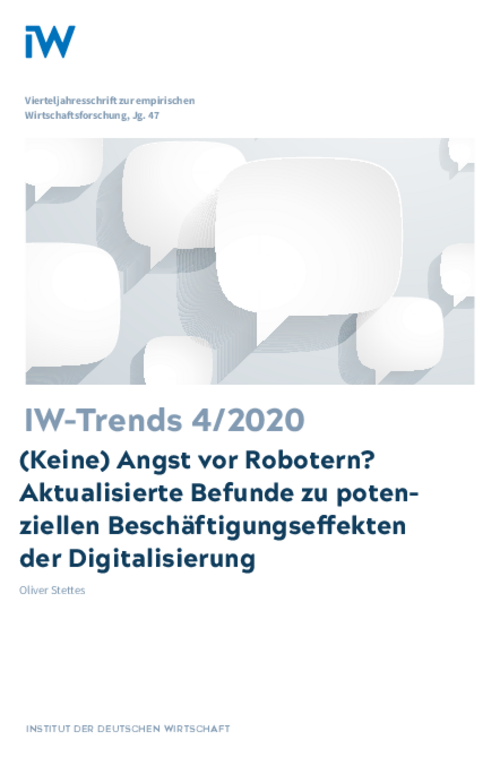The effect of digital technologies on employment remains diffuse. Recent empirical analyses at the establishment and occupational levels certainly find no evidence that the digital transition has led, or will lead, to systematic job cuts.

(No) Fear of Robots?: Updated Findings on the Potential Employment Effects of Digitalisation
IW-Trends

The effect of digital technologies on employment remains diffuse. Recent empirical analyses at the establishment and occupational levels certainly find no evidence that the digital transition has led, or will lead, to systematic job cuts.
Findings based on the 2019 and 2020 IW Personnel Panels, for example, indicate that companies' personnel planning for the current financial year has no systematic correlation with the number and type of digitalisation technologies deployed. Companies planning to reduce staff in the course of 2020 use an average of 2.4 technologies – almost as many as companies planning to increase their workforce (2.5). At an average of 2.1 technologies, the use of technology by firms that plan to maintain present staffing levels in the current financial year is somewhat more restrained. The impact of automation does seem to have slowed employment growth between 2014 and 2019. However, analysis at the occupational level indicates that skills shortages have been just as much an obstacle to greater employment growth, a conclusion that applies particularly to openings for skilled workers and specialists. Finally, the empirical findings indicate that, especially where jobs requiring little training or experience are concerned, the opportunities for automation are often not fully exploited or have less impact on employment than has generally been assumed.

Oliver Stettes: (Keine) Angst vor Robotern? Aktualisierte Befunde zu potenziellen Beschäftigungseffekten der Digitalisierung
IW-Trends

More on the topic

Determinants of personnel planning in Germany
The German labor market has been growing since 2005. The dip in the wake of the coronavirus pandemic between 2020 and 2022 is an exception, as the German labor market has reached a record level of 45.9 million people in employment by 2023.
IW
Orphaned executive chairs in German companies
In 2023, half of the companies in Germany reported increasing problems in filling vacancies for management positions because employees are not aiming for a career. Larger companies are less affected than small companies.
IW